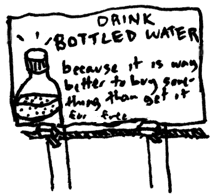Don't go chasing bottled water falls
 It's always nice to see coverage of a campaign that is likely just starting off, and sure to get bigger among progressives and social justice activists, especially those concerned about the environment. Case in point, check out this news article from the Toronto Globe and Mail on the United Church of Canada calling for a boycott of bottled water, and issuing a declaration that they will not use bottled water at their future gatherings and meetings.
It's always nice to see coverage of a campaign that is likely just starting off, and sure to get bigger among progressives and social justice activists, especially those concerned about the environment. Case in point, check out this news article from the Toronto Globe and Mail on the United Church of Canada calling for a boycott of bottled water, and issuing a declaration that they will not use bottled water at their future gatherings and meetings.I'm sure this is likely to rile up people. The hype is that bottled water is safer, it's trendier, and tastes better. But bottled water carries quite the baggage in the developing world, as mega-giant corporations seek to privatize water and sell it for a profit - thus limiting its access to people who might really need it, and also turning something that's a critical basic need into a commodity. God forbid they ever figure out how to privatize air!
David Hellman from the United Church of Christ had this to say:
Water is seen increasingly as a saleable commodity, [being used] to make a profit, as opposed to our perspective of it being an element of life and good for all creation.
Many writers, too, including Vandana Shiva, have asserted that our next wars are going to be fought over water, just as our current wars are fought over oil. I think she's right, which might be why corporations (pepsi and their aquafina, coke and their dasani) are licking their chops to get access to own and market water.
For more information on the United Church of Canada's boycott, go to http://www.kairoscanada.org/e/ecology/water/index.asp.
 I've been trying to articulate a comment about Venezuelan President Hugo Chavez's comments to the UN last week, where he, in dramatic flair, criticized President Bush as the devil, and made an Amazon.com superstar out of Noam Chomsky.
I've been trying to articulate a comment about Venezuelan President Hugo Chavez's comments to the UN last week, where he, in dramatic flair, criticized President Bush as the devil, and made an Amazon.com superstar out of Noam Chomsky. A friend of mine forwarded me the following reflection from Henri Nouwen, perhaps appropriate on Sunday, since it's the day we're all supposed to rest (instead of clinging to our blackberries for life support). Nouwen is a writer and theologian who I often find quite profound, though for some of his stuff I feel like an advanced degree in theology might be necessary (either that, or I'm just too flighty). This little reflection on creation is great, and could really be a guiding force behind the new energy toward merging the faith-based and environmental movements. Here ya' go:
A friend of mine forwarded me the following reflection from Henri Nouwen, perhaps appropriate on Sunday, since it's the day we're all supposed to rest (instead of clinging to our blackberries for life support). Nouwen is a writer and theologian who I often find quite profound, though for some of his stuff I feel like an advanced degree in theology might be necessary (either that, or I'm just too flighty). This little reflection on creation is great, and could really be a guiding force behind the new energy toward merging the faith-based and environmental movements. Here ya' go: You learn something new every day.
You learn something new every day. A lot of attention has been paid this past week to death-inducing sea creatures, given Steve Irwin's untimely death.
A lot of attention has been paid this past week to death-inducing sea creatures, given Steve Irwin's untimely death.  Despite the fact that half of her campaign staff resigned, she was tied to a corrupt defense contractor, and the National Republican Party wouldn't offer an official endorsement of her,
Despite the fact that half of her campaign staff resigned, she was tied to a corrupt defense contractor, and the National Republican Party wouldn't offer an official endorsement of her,  With the launch of
With the launch of 
